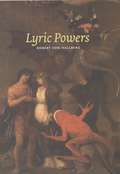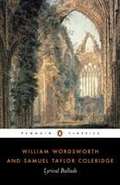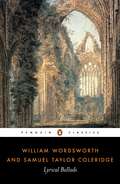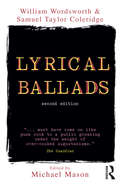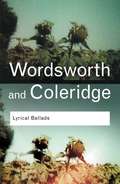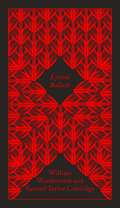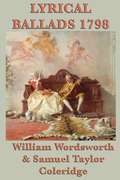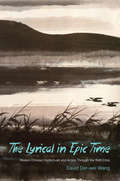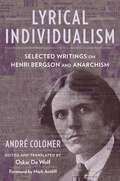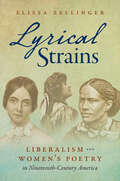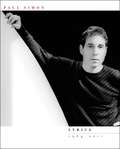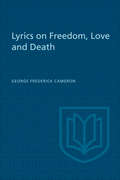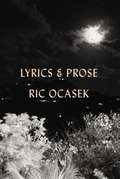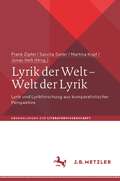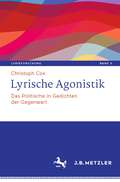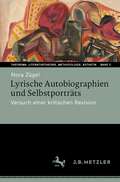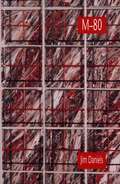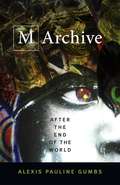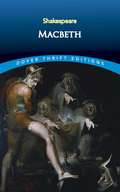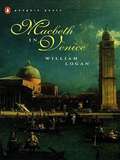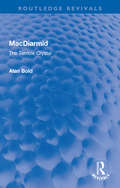- Table View
- List View
Lyric Powers
by Robert von HallbergThe authority of poetry varies from one period to another, from one culture to another. For Robert von Hallberg, the authority of lyric poetry has three sources: religious affirmation, the social institutions of those who speak the idioms from which particular poems are made, and the extraordinary cognition generated by the formal and musical resources of poems. Lyric Powers helps students, poets, and general readers to recognize the pleasures and understand the ambitions of lyric poetry. To explain why a reader might prefer one kind of poem to another, von Hallberg analyzes—beyond the political and intellectual significance of poems—the musicality of both lyric poetry and popular song, including that of Tin Pan Alley and doo-wop. He shows that poets have distinctive intellectual resources—not just rhetorical resources—for examining their subjects, and that the power of poetic language to generalize, not particularize, is what justly deserves a critic’s attention. The first book in more than a decade from this respected critic, Lyric Powers will be celebrated as a genuine event by readers of poetry and literary criticism.
Lyric Shame: The "Lyric" Subject of Contemporary American Poetry
by Gillian WhiteGillian White argues that the poetry wars among critics and practitioners are shaped by "lyric shame"--an unspoken but pervasive embarrassment over what poetry is, should be, and fails to be. "Lyric" is less a specific genre than a way to project subjectivity onto poems--an idealized poem that is nowhere and yet everywhere.
Lyrical Ballads (Penguin Classics)
by Samuel Taylor Coleridge William Wordsworth Michael SchmidtTwenty-three poems that transformed English poetry <P><P> Wordsworth and Coleridge composed this powerful selection of poetry during their youthful and intimate friendship. Reproducing the first edition of 1798, this edition of Lyrical Ballads allows modern readers to recapture the book’s original impact. In these poems—including Wordsworth’s “Lines written a few miles above Tintern Abbey” and Coleridge’s “The Rime of the Ancyent Marinere”—the two poets exercised new energies and opened up new themes.
Lyrical Ballads (Routledge Classics Ser.)
by Samuel Coleridge William WordsworthPublished in 1798, Lyrical Ballads is a dazzling collaboration containing twenty-three poems by close friends, William Wordsworth (1770-1850) and Samuel Taylor Coleridge (1772-1834) - two major figures of English Romanticism. The volume heralded a new approach to poetry and expresses the poets' reflections on mankind's relationship with the forces of the world. Coleridge's contribution includes the nightmarish vision of 'The Rime of the Ancyent Marinere', one of the works for which he became best known, as well as the fantastical conversational poem 'The Foster-Mother's Tale' and the melancholic 'The Nightingale'. Wordsworth's 'We are Seven' depicts a child's naïve optimism in the face of the cruel mortality, while 'Goody Blake and Harry Gill' and 'Simon Lee' celebrate the simplicity and strength he perceived in country people, and 'Tintern Abbey' explores the healing powers of nature.Published as part of the Penguin Poetry First Editions series in which the greatest collections of poetry in English will be published in their original form. All texts have been completely reset and some minor changes made to punctuation.
Lyrical Ballads
by Michael MasonLyrical Ballads by William Wordsworth and Samuel Taylor Coleridge is a unique work of literature. first published in 1798, it marked a radical change in the direction of English Literature. Lyrical Ballads represented a movement away from the overwrought, highly formal and learned verse of the 18th century and in so doing ushered in a new, more democratic poetic era. Written in the language of the common man and addressing the concerns of the common man, Lyrical Ballads was the first - and remains the most - truly revolutionary collection of poetry, paving the way for the great Romantic poets - keats, Byron, Shelley et al. - and proving that, while there was no actual revolution on the ground, England could still be the most revolutionary of places. Lyrical Ballads was not a single phenomenon but a sequence of four editions spread over seven years; its appearance in English literature was not a historical moment but a sequence of moments - 1798, 1800, 1802, 1805. This edition - based on the 1805 edition, but looking back on each of the previous publications - shows how this collection developed, how it was refined and added to by the authors. No other edition on the market has such a wealth of key background information.
Lyrical Ballads (Routledge Classics)
by William Wordsworth Samuel Taylor ColeridgeWhen it was first published, Lyrical Ballads enraged the critics of the day: Wordsworth and Coleridge had given poetry a voice, one decidedly different to that which had been voiced before. This acclaimed Routledge Classics edition offers the reader the opportunity to study the poems in their original contexts as they appeared to Coleridge’s and Wordsworth’s contemporaries, and includes some of their most famous poems, including Coleridge’s Rime of the Ancyent Marinere.
Lyrical Ballads (Penguin Clothbound Poetry)
by William Wordsworth Samuel Taylor ColeridgeA collectible new Penguin Classics series: stunning, clothbound editions of ten favourite poets, which present each poet's most famous book of verse as it was originally published. Designed by the acclaimed Coralie Bickford-Smith and beautifully set, these slim, A format volumes are the ultimate gift editions for poetry lovers. Lyrical Ballads (1798) is a landmark collection of poems that marks the beginning of the English Romantic Movement in literature. Co-written by friends William Wordsworth and Samuel Taylor Coleridge, the collection broke away from traditional poetic form. Of the twenty-three poems, Wordsworth penned works such as 'Lines written a few miles above Tintern Abbey' and 'The Idiot Boy' that use colloquial speech and take the everyday as their theme. The collection also includes Coleridge's greatest poem 'The Rime of the Ancyent Marinere', a supernatural tale of a sailor's voyage.
Lyrical Ballads 1798
by William WordsworthLyrical Ballads, with a Few Other Poems is a collection of poems by William Wordsworth and Samuel Taylor Coleridge, first published in 1798 and generally considered to have marked the beginning of the English Romantic movement in literature. The immediate effect on critics was modest, but it became and remains a landmark, changing the course of English literature and poetry.
The Lyrical in Epic Time: Modern Chinese Intellectuals and Artists Through the 1949 Crisis
by David Der-wei WangIn this book, David Der-wei Wang uses the lyrical to rethink the dynamics of Chinese modernity. Although the form may seem unusual for representing China's social and political crises in the mid-twentieth century, Wang contends that national cataclysm and mass movements intensified Chinese lyricism in extraordinary ways. Wang calls attention to the form's vigor and variety at an unlikely juncture in Chinese history and the precarious consequences it brought about: betrayal, self-abjuration, suicide, and silence. Despite their divergent backgrounds and commitments, the writers, artists, and intellectuals discussed in this book all took lyricism as a way to explore selfhood in relation to solidarity, the role of the artist in history, and the potential for poetry to illuminate crisis. They experimented with poetry, fiction, film, intellectual treatise, political manifesto, painting, calligraphy, and music. Western critics, Wang shows, also used lyricism to critique their perilous, epic time. He reads Martin Heidegger, Theodor Adorno, Cleanth Brooks, and Paul de Man, among others, to complete his portrait.The Chinese case only further intensifies the permeable nature of lyrical discourse, forcing us to reengage with the dominant role of revolution and enlightenment in shaping Chinese—and global—modernity. Wang's remarkable survey reestablishes Chinese lyricism's deep roots in its own native traditions, along with Western influences, and realizes the relevance of such a lyrical calling of the past century to our time.
The Lyrical in Epic Time
by David Der-Wei WangThis book positions the lyrical as key to rethinking the dynamics of Chinese modernity and emphasizes Chinese lyricism's deep roots in its own native traditions
Lyrical Individualism: Selected Writings on Henri Bergson and Anarchism (Columbia Themes in Philosophy, Social Criticism, and the Arts)
by Andre ColomerIn the early twentieth century, André Colomer was perhaps the best-known figure in the anarchist movement. A poet, philosopher, activist, and public speaker, he was enmeshed in the Parisian political and artistic scene at a time of political and cultural revolution. Amid the avant-garde explosions of Cubism, futurism, and surrealism and the ferment of radical politics on left and right, Colomer became anarchism’s leading advocate. He galvanized the Parisian public through his agitational writing and organizing, as well as his involvement in a sensational murder case, while developing a distinctive philosophical account of anarchist individualism. Yet Colomer died in obscurity in Moscow, abandoned by his friends and comrades, and is scarcely known in the English-speaking world today.Lyrical Individualism presents a selection of Colomer’s crucial writings, with a focus on anarchist theory and the philosophy of Henri Bergson. It reveals the richness of Colomer’s philosophical work, particularly his creative engagement with Bergson, Max Stirner, and Friedrich Nietzsche to forge a novel anarchist ideology. Colomer’s writings not only offer valuable insights into interwar anarchism, they also present a distinctive philosophical vision that in many ways anticipates theories and debates animating radical political movements today. This book also showcases his acerbic and pugnacious political commentary on the turbulent events of the 1910s and 1920s. The first translation and publication of Colomer’s work since his untimely death in 1931, Lyrical Individualism allows a range of readers to discover this vital thinker.
Lyrical Strains: Liberalism and Women's Poetry in Nineteenth-Century America
by Elissa ZellingerIn this book, Elissa Zellinger analyzes both political philosophy and poetic theory in order to chronicle the consolidation of the modern lyric and the liberal subject across the long nineteenth century. In the nineteenth-century United States, both liberalism and lyric sought self-definition by practicing techniques of exclusion. Liberalism was a political philosophy whose supposed universals were limited to white men and created by omitting women, the enslaved, and Native peoples. The conventions of poetic reception only redoubled the sense that liberal selfhood defined its boundaries by refusing raced and gendered others. Yet Zellinger argues that it is precisely the poetics of the excluded that offer insights into the dynamic processes that came to form the modern liberal and lyric subjects. She examines poets—Frances Sargent Osgood, Elizabeth Oakes Smith, Frances Ellen Watkins Harper, Edna St. Vincent Millay, and E. Pauline Johnson—whose work uses lyric practices to contest the very assumptions about selfhood responsible for denying them the political and social freedoms enjoyed by full liberal subjects. In its consideration of politics and poetics, this project offers a new approach to genre and gender that will help shape the field of nineteenth-century American literary studies.
Lyrics 1964-2008
by Paul SimonA landmark compilation of popular music, this collection contains Paul Simon's lyrics from his first album in 1964 to the present.
Lyrics on Freedom, Love and Death
by Douglas Lochhead George Frederick CameronA.J.M. Smith has described George Frederick Cameron as one of 'Canada's greatest poets,' who, with Isabella Valancy Crawford and Archibald Lampman, 'were cut off just when their work had reached maturity.' Cameron's poetry is rich in classical culture, and involves itself with political concerns, love and death.
Lyrics & Prose
by Ric OcasekEmerging from the New Wave music scene of the late '70s, The Cars catapulted to success with the very first single--"Just What I Needed"--off of their debut album. Led by Ric Ocasek, the lead vocalist (along with Benjamin Orr), rhythm guitarist, and songwriter, The Cars became one of the most successful bands of the '80s--and their songs are just as beloved by fans today. Ocasek himself has had an illustrious career beyond The Cars, from writing and performing solo work, publishing poetry in Granta and elsewhere, and producing albums by musical artists like Weezer, Hole, Guided By Voices, and Jonathan Richman. In Lyrics & Prose, Ocasek collects his lyrics together for the first time--and included throughout are Ocasek's early handwritten notes and set lists, doodles and all. His work spans from The Cars' self titled debut album in 1978 to Move Like This, released in 2011, as well as Ocasek's six solo albums. This is not merely a songbook for fans of The Cars, however: Ocasek is a versatile and affecting poet as well as songwriter, and his original verses--interspersed with album artwork and more than twenty-five beautiful black and white photographs--round out this beguiling book.
Lyrik der Welt – Welt der Lyrik: Lyrik und Lyrikforschung aus komparatistischer Perspektive (Abhandlungen zur Literaturwissenschaft)
by Frank Zipfel Sascha Seiler Martina Kopf Jonas HeßLyrik und Lyriktheorie wurden in der Komparatistik oft vernachlässigt. Aufgrund der besonderen Sprachgebundenheit von Lyrik ist es zwar nicht selbstverständlich, sie aus einer transnationalen, sprachübergreifenden Perspektive zu untersuchen, allerdings bleiben dann wichtige Aspekte der internationalen zeitgenössischen Lyrikproduktion und der Lyriktradition unerkannt und unerforscht. Dieser Sammelband liefert einen Beitrag zur Schließung dieser Lücke, indem er das komplexe Verhältnis zwischen „Lyrik“ und „Welt“ aus komparatistischer Perspektive untersucht und reflektiert. In der Nachfolge von Konzepten wie Goethes Weltpoesie, Ezra Pounds world poetry oder Enzensbergers poetischer Weltsprache, wird die Internationalität der Lyrik in ihrer Verbindung mit verschiedenen ‚Welten‘ beleuchtet: ihr Bezug zur Lebenswelt, ihr Stellung in der Medienwelt, ihre Erforschung in der Wissenschaftswelt.
Lyrische Agonistik: Das Politische in Gedichten der Gegenwart (Lyrikforschung. Neue Arbeiten zur Theorie und Geschichte der Lyrik #3)
by Christoph CoxAusgehend von der These, dass es sich bei der politischen Lyrik der Gegenwart vor allem um eine Lyrik des Politischen, eine lyrische Streitkultur handelt, wird in „Lyrische Agonistik. Das Politische in Gedichten der Gegenwart“ auf der Basis einer philosophischen ‚neue‘ Rhetorik und mit Rückbezug auf Ansätze der radikalen Demokratietheorie insbesondere von Chantal Mouffe und Ernesto Laclau eine neuartige rhetorische Methode zur Analyse des Politischen in der Lyrik der Gegenwart entwickelt. Grundlegend für diese Methode ist die von sophistischer Rhetoriktradition und radikaler Demokratietheorie geteilte Skepsis gegenüber allen epistemischen Letztbegründungsversuchen. Das Politische in der Lyrik der Gegenwart erweist sich im Kontext dieser beiden Bezugspunkte als die Zurückweisung fundamentaler Gründungversuche, die sich als diskursive Form der Verhandlung einer nur plausiblen, in ihrer Kontingenz stets angreifbaren Politik äußert. Ablesbar wird diese postfundamentalistische Wende in gegenwärtigen Gedichten anhand von rhetorischen Widersprüchen, die auf den unaufhebbaren konflikthaften Charakter des Politischen hindeuten, deren notwendige Gegenseite der ebenso rhetorisch ausgearbeitete Versuch ist, umstrittene Diskurse zugunsten einer nie letztbegründbaren Position zu hegemonisieren. Aufgezeigt wird das dem Politischen eigene Spiel aus Kontingenzerfahrung und Schließungsbemühungen anhand von drei disparaten Textbeispielen politischer Lyrik der letzten zehn Jahre: Tom Schulz’ „Die Maschinen sind volljährig“, Günter Grass’ „Was gesagt werden muss“ und Monika Rincks „was machen die frauen am sonntag?“.
Lyrische Autobiographien und Selbstporträts: Versuch einer kritischen Revision (Theorema. Literaturtheorie, Methodologie, Ästhetik #2)
by Nora ZügelDas Buch widmet sich der Erforschung von ‚lyrischen Selbstentwürfen‘, also lyrischen Texten, die Textmerkmale aufweisen, auf Grund derer LeserInnen mit guten Gründen annehmen können, dass diese eine literarische Selbstthematisierung ihres Verfassers oder ihrer Verfasserin darstellen. Verschiedene literaturwissenschaftliche Grundannahmen – insbesondere der konventionalisierte Anspruch, ‚lyrisches Ich‘ und AutorIn streng zu unterscheiden – haben eine umfängliche Auseinandersetzung mit ihnen bis in die Gegenwart erschwert. Ausgehend von Widersprüchen, Inkonsistenzen oder Leerstellen bisheriger Interpretationspraktiken und theoretischer Konzepte zielt die Studie darauf, eine Theorie des lyrischen Selbstentwurfs auszuarbeiten und hierdurch lyrische Werke, die eine Referenz auf ihren Autor oder ihre Autorin anbieten, stärker in das Bewusstsein der Literaturwissenschaft zu rücken und als eigene Textsorte klarer zu konturieren. Aus diesen Zielsetzungen folgt der zweiteilige Aufbau der Untersuchung: Teil I unterwirft etablierte Praktiken, Theorien und Begriffe einer kritischen Revision, Teil II schließt auf Basis der erfolgten Bestandsaufnahme ausgemachte konzeptuelle Lücken, entwickelt ergänzende Analysebegriffe, zeigt ihre Verwendungsmöglichkeiten an konkreten Beispielen auf und bindet die zunächst abstrakt bleibenden Ausführungen an konkrete Texte zurück, wodurch zugleich die Vielfalt der existierenden Erscheinungsformen der betrachteten Gattung veranschaulicht wird. Damit ist die Arbeit vor allem als literaturtheoretische Grundlagenforschung einzuordnen, liefert darüber hinaus aber auch Interpretationen exemplarischer Textbeispiele (u.a. von Oswald von Wolkenstein, Goethe, Droste-Hülshoff, Brecht, Rilke, Jandl, Mayröcker, Jan Wagner). Die kritischen, forschungsgeschichtlich und praxeologisch perspektivierten Fragen fokussieren sich unter anderem auf die Begriffe des „lyrischen Ichs“, des „Sprechers“, des „abstrakten Autors“, auf bisherige Versuche einer Positionsbestimmung der Lyrik zwischen Fiktionalität und Faktualität und auf die Marginalisierung der Lyrik innerhalb der Autobiographieforschung.
M-80
by Jim DanielsA collection of the author's poetry; free verse set in America and exploring American themes of struggle, coming of age, resistance, and resilience.
M Archive: After The End Of The World
by Alexis GumbsFollowing the innovative collection Spill, Alexis Pauline Gumbs's M Archive--the second book in a planned experimental triptych--is a series of poetic artifacts that speculatively documents the persistence of Black life following a worldwide cataclysm. Engaging with the work of the foundational Black feminist theorist M. Jacqui Alexander, and following the trajectory of Gumbs's acclaimed visionary fiction short story "Evidence," M Archive is told from the perspective of a future researcher who uncovers evidence of the conditions of late capitalism, antiblackness, and environmental crisis while examining possibilities of being that exceed the human. By exploring how Black feminist theory is already after the end of the world, Gumbs reinscribes the possibilities and potentials of scholarship while demonstrating the impossibility of demarcating the lines between art, science, spirit, scholarship, and politics.
Macbeth (Dover Thrift Editions)
by William ShakespeareOne of the great Shakespearean tragedies, Macbeth is a dark and bloody drama of ambition, murder, guilt, and revenge. <P><P>Prompted by the prophecies of three mysterious witches and goaded by his ambitious wife, the Scottish thane Macbeth murders Duncan, King of Scotland, in order to succeed him on the throne. <P>This foul deed soon entangles the conscience-stricken nobleman in a web of treachery, deceit, and more murders, which ultimately spells his doom. <P>Set amid the gloomy castles and lonely heaths of medieval Scotland, Macbeth paints a striking dramatic portrait of a man of honor and integrity destroyed by a fatal character flaw and the tortures of a guilty imagination. <P>A selection of the Common Core State Standards Initiative.
Macbeth in Venice
by William LoganOne of the most technically gifted poets of his generation, William Logan here presents four sequences, each of which is haunted by the battered history of the enchanted city of Venice: two refugees from Nazi Germany replay a version of the Aeneid that shadows their lives in and out of Venice; the comedy of Tiepolo's Punchinello drawings are given mocking narrative; a modern traveler finds in Venice's insects, birds, and fish a nature that endures within an unnatural city; and, in a formal sequence reminiscent of W. H. Auden's "The Sea and the Mirror," King James commissions a revision of Macbeth in order to impress the chief magistrate. These new poems showcase Logan's trademark refinement and erudition. .
Macbeth in Venice
by William LoganOne of the most technically gifted poets of his generation, William Logan here presents four sequences, each of which is haunted by the battered history of the enchanted city of Venice: two refugees from Nazi Germany replay a version of the Aeneid that shadows their lives in and out of Venice; the comedy of Tiepolo's Punchinello drawings are given mocking narrative; a modern traveler finds in Venice's insects, birds, and fish a nature that endures within an unnatural city; and, in a formal sequence reminiscent of W. H. Auden's "The Sea and the Mirror," King James commissions a revision of Macbeth in order to impress the chief magistrate. These new poems showcase Logan's trademark refinement and erudition.
MacDiarmid: The Terrible Crystal (Routledge Revivals)
by Alan BoldFirst published in 1983, Hugh MacDiarmid: The Terrible Crystal is a detailed introduction to the poetry of Hugh MacDiarmid. Hugh MacDiarmid’s poetry shows a persistent search for a consistent intellectual vision that reveals, in all its facets, the source of creativity recognised by the poet as ‘the terrible crystal’. This introduction to his poetry shows that MacDiarmid’s great achievement was a poetry of evolutionary idealism, that draws attention to itself by a series of culture shocks. It places MacDiarmid as a nationalist poet in an international context: a man whose unique concept of creative unity enabled him to combine the Scottish tradition with the linguistic experimentation of Joyce and Pound. Hugh MacDiarmid: The Terrible Crystal is ideal for those with an interest in the poetry of Hugh MacDiarmid, Scottish poetry, and poetry and criticism more broadly.
